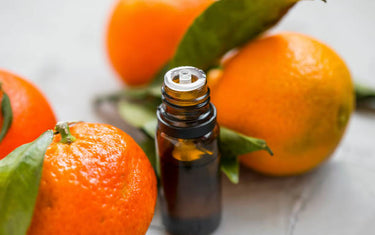6 min read / 3 February 2022 / Laura Garvin Gomez
Benefits and Uses of Aniseed Oil
Liquorice-scented aniseed is uplifting and has powerful soothing and healing abilities.

Aniseed oil may be similar in scent to fennel seed or star anise, but it’s actually closer related to carrots and celery.
Also known as anise (though not to be confused with star anise), the liquorice-like scent of aniseed essential oil can be somewhat divisive.
But despite its hit-or-miss scent, aniseed has been in use for thousands of years across a number of ancient societies and is even mentioned in the Bible.
These days, aniseed oil is perhaps most commonly used for its powerful healing and soothing abilities, although it has some lesser-known benefits, particularly for women in menopause.

What is Aniseed Essential Oil?Distilled from the seeds of the anise plant, native to Egypt, aniseed essential oil is often compared to fennel or star anise due to its liquorice scent and distinctive name – but it is closer to parsley or celery in terms of relation. Warm, sweet, and lightly spicy, aniseed essential oil is a great top note for enhancing blends containing other spicy scents, as well as more earthy aromas. Aniseed is also known by the botanical name Pimpinella anisum and is generally clear in colour with a thin consistency. |
Aniseed vs Star Anise
Despite their similar names and scents, aniseed and star anise come from two entirely different plants.
Star anise is also slightly sweeter in its scent profile, though both oils do contain very similar benefits for the body and mind.
What are the benefits of Aniseed Essential Oil?
Traditionally used as a spice for cooking as well as to flavour toothpaste, aniseed is a powerhouse for a number of bodily functions, and has recently been revered for its impactful properties on the mind too.
Some of the best aniseed essential oil benefits include:
- Ability to lift low moods
- Antibacterial and antifungal
- Anti-inflammatory
- Menopause relief

Using aniseed essential oil to help lift low moods
There is evidence to suggest that aniseed may be able to act as an effective mood booster for extreme cases of low emotion.
A study in 2016 found that the oil had an intense boosting effect on animals, and further research in 2016 saw a similar effect on humans.
These studies found that aniseed was able to significantly reduce symptoms of mild to moderate levels of low mood in subjects, brightening their state of mind and increasing positivity.
A low mood can affect many things, from our productivity to our relationships. Diffusing aniseed oil can be a great way to lift low moods and inspire happiness.

Is aniseed oil antibacterial and antifungal?
A study in 2005 found that aniseed was effective against various strains of fungi and yeast, and research shows that the oil may even be effective against dermatophytes - a type of fungus that can cause skin disease.
With this in mind, adding a few drops of aniseed oil to a carrier oil may make a great home treatment for fungal infections as a first step.
Further research has shown that aniseed also exhibits significant antibacterial activity.
A study in 2015 found that anethole, an active ingredient in aniseed, is able to inhibit bacterial growth to such an extent that it successfully managed to block a strain responsible for cholera.
Some sources have pointed out aniseed’s possible wound healing properties – derived as a result of its strong antiseptic and antibacterial factors. Using the oil to aid small cuts, scraps or bruises could be an effective remedy.

Does aniseed essential oil have anti-inflammatory effects?
Aniseed oil may be a useful treatment for sore muscles and inflammatory conditions caused by injuries or infections in the body.
An animal study in 2006 found that aniseed oil was able to reduce swelling and accompanying pain, with analgesic effects comparable to that of aspirin and other common pain-reliving medications.
A review in 2012 also found that aniseed oil is high in antioxidants. Antioxidants are beneficial for the body in a number of ways, crucially inhibiting the activity of free radicals and preventing oxidative damage.
Antioxidants can also be beneficial in reducing inflammation in the body and protecting from some serious health conditions.

Can aniseed oil reduce symptoms of menopause?
Menopause can cause a number of unpleasant symptoms in older women as a result of a natural decline in hormones.
Aniseed is thought to mimic the effects of the hormone oestrogen in the body, which in turn can help reduce the common symptoms of menopause including hot flashes, dry skin and fatigue.
A study in 2012 supported this when it found that aniseed oil was able to cause a 75% reduction in severity and frequency of hot flashes.
Diffusing aniseed oil may help to manage unpleasant menopausal symptoms.

How to use Aniseed Essential Oil
Aromatherapy
Even though the smell of aniseed is divisive – depending on whether or not you like the scent of liquorice – diffusing it around your home can still carry a great deal of impact on your mental health.
The supposed sedative qualities of aniseed can help reduce stress and lift low moods, encouraging a sounder environment for sleep and relaxation as well as improving levels of positivity.
Bath
A few drops of aniseed essential oil can also be added to your bath as an alternative to aromatherapy.
The scent of the oil will help to calm your mind, as well as soothe sore muscles or joints caused as a result of inflammation.
Massage
Another way to utilise the anti-inflammatory properties of aniseed oil is through a restorative massage.
Combining the oil with a moisturising carrier oil is extremely beneficial for helping to heal inflammatory conditions, and can even prove effective against symptoms of menopause if rubbed into the temples or onto the lower abdomen.
Skincare
Aniseed oil’s antibacterial and antifungal benefits give it the ability to act as a functioning facial cleanser – helping to clear pores of bacteria as well as prevent infection.
This oil can also be used to help clean small wounds or abrasions, though try to avoid applying it directly to an open wound.
It is always recommended to dilute essential oils with a carrier oil and perform a patch test before use.
Cleaning
Combining aniseed with water and an emulsifier (like dish soap) can help to keep surfaces clean and healthy as a result of the oil’s ability to kill harmful bacteria.
Use as part of your normal cleaning routine, or spray now and again to give surfaces an extra boost of protection.
Candle and soap making
Aniseed essential oil can make for a highly prominent top note in perfumery, so is an ideal addition to soaps and candles if you need a little extra body in your fragrances.
We recommend following a tested recipe, or checking out some of our beginner’s guides for soap and candle making if you’re just getting started.

History of Aniseed Essential Oil
Cultivated by the ancient Egyptians as both a medicine and a spice for cooking, aniseed was often considered to “refresh the heart” due to its restorative attributes.
It was also popular in ancient Greek and Roman medicine and was lauded by many of their leading figures as a mood-boosting aid.
In fact, aniseed was once so valuable that it was used as currency, as well as for scenting clothes during the 15th century.

Just like the sweet that it reminds us of, the liquorice scent of aniseed essential oil can spark joy.
Not only that, but its soothing, healing abilities can relieve various kinds of discomfort and help to ensure our health and wellness.
Shop our aniseed essential oil here.
|
Product Name |
100% Pure Aniseed (Anise) Essential Oil |
| Botanical Name | Pimpinella Anisum |
| Scent Type | Spices |
| Benefits & Uses | Antibacterial, Antifungal, Hot Flash Aid |
| Suitable for Diffusers? | Yes, this aniseed (anise) essential oil is perfect for diffusers. |
| Suitable for Candles and Soaps? | Yes, this aniseed (anise) essential oil is perfect for candle and soap making. |
| Extraction Method | Steam Distillation |
| Bottle Type | Tamper proof and UV resistant |









